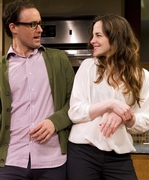SITE GUIDE
SEARCH
REVIEWS
REVIEW ARCHIVES
ADVERTISING AT CURTAINUP
FEATURES
NEWS
Etcetera and
Short Term Listings
LISTINGS
Broadway
Off-Broadway
NYC Restaurants
BOOKS and CDs
OTHER PLACES
Berkshires
London
California
New Jersey
DC
Connecticut
Philadelphia
Elsewhere
QUOTES
TKTS
PLAYWRIGHTS' ALBUMS
LETTERS TO EDITOR
FILM
LINKS
MISCELLANEOUS
Free Updates
Masthead
A CurtainUp Review
Cradle and All
By Elyse Sommer
|
. . . what with my birthday coming up - I just - I - I'm starting to feel like - like-, our
relationship these last five years - has been great, but. . . I keep coming to
the conclusion that- Now don't be angry-- Is - it -- enough?. — Claire in Act 1, Infantry. I still don't understand why we need Lisa if all she does is tell us exactly what we read in that book. — Nate in Act 2, The Extiction Method, about the woman who's working with them on dealing with their baby's not going to sleep. Annie's likening her function to that of a personal trainer without whom they wouldn't have the strength to let their baby cry for hours seems not only over priced at $300 an hour, and generally feeling what they're doing as something "foreign" and something "Jews don't do." |

Greg Keller and Maria Dizzia in Cradle and All
(Photo: Joan Marcus) |
Goldfarb does, however, return to issues affecting modern men and women in their thirties or early forties: The effect of personal backgrounds and careers on compatibility and life styles. . . the choice to have or not have children. . . the difficulties facing those opting for parenthood, especially if a baby isn't quite the bundle of joy anticipated.
In Goldfarb's previous play with Manhattan Theater Club, Sarah, Sarah, my favorite of his plays, he tapped into a little explored sociological phenomenon of single Americans adopting Asian babies. The excitement and tension of such an adoption served to uncork the often painful history of the Toronto Jewish family of which this orphan would be a part. To ramp up the drama, the baby is sickly and thus delays the journey home. In Goldfarb's most comic play, Modern Orthodox, a thirty-six-year-old investment banker decides it's time to transform his six-year living-together relationship with a doctor into something more fully committed, a decision that, courtesy of an intrusive diamond merchant, challenges him to also commit to a less assimilated and more Jewish life style.
Cradle and All is actually two one-acts about two different couples whose stories are connected geographically and thematically: The couples, both played with great flair by Maria Dizzia and Greg Keller, live in adjoining co-op apartments in New York's Brooklyn Heights. In the first act, Infantry, Claire who's on the cusp of 40 (but as it turns out, 41) and Luke who's 34 are dealing with Claire's change of heart about their agreement not to have children. The second act, The Extinction Method, focuses on Annie and Nate's applying a behavioral technique for dealing with the baby girl they love but who has kept them sleepless since its birth eleven months earlier. (Google it and you'll see that there is really an Extinction Method for dealing with sleep disorders).
As with his previous plays, Goldfarb displays a flair for crisp and often funny dialogue very much of his characters' zeitgeist. The new play deftly uses one pair of actors to play both couples and keeping each play more or less free standing.
The only interaction between the couples is a brief heard but not seen moment in Claire and Luke's hallway, when Nate comes to borrow an egg. The paralell crises prove to be a neat device for linking the two stories. and leave us pondering all the variations given that ultimately there's no neat solution to the problems facing these couples and their many counterparts (The devastating recession's effect on couples with stalled or completely ended careers comes immediately to mind as the domestic war story that's yet to be written).
If there's any message here it's that there are no win-win-win life choices. It's damned if you do opt for marriage and kids since even babies who don't keep their parents sleepless to the point of exhaustion, have a way of making it hard to keep the romantic bloom on a marriage; nor are decisions about childcare frustration prone. It's also damned if you don't go the marriage and babies route since an unencumbered life style is no guarantee that the careers will flourish or that sex and the "cosmopolitan" life style Luke loves will become less exciting
If all this sounds as if Goldfarb is stacking the cards in favor of traditional marriage where problems are more likely to be ironed out, so he does. He is, after al, himself married and a father which hasn't prevented him from thriving in his chosen profession. Consequently, the first act is a contemporary tragedy. It starts out on an upbeat note, with roses filling vases all over the neat, sleek living-dining room to celebrate Luke's landing his first really big commission in his job as an antiques dealer in his uncle's firm. It's also Claire's birthday which Claire isn't especially eager to celebrate.
The first act, though serious, is not without humorous touches and smart bits of dialogue, like Luke's receiving the drink Claire hands him with " I love that we are upholding the tradition of the cocktail hour. It's so Mad Men." As Claire and Luke's story nears its climax, it becomes clear that though they don't seem to be on particularly close terms with the couple next door, the birth of the constantly crying Olivia has not just turned her parents' lives upside down, but triggered Claire's need to change the rules of her relationship with Luke. The shift from celebration to confrontation turns out to be the boiling over of long simmering problems Luke has not been blind to the fact that Claire has been leaving baby gifts at the door of their neighbors' apartment and they've apparently had previous to be or not to be parents discussions but the discussion to which we're privvy is critical since it also opens a Pandora's box of never before shared events and disappointments.
As I already mentioned the playwright has sort of stacked the deck. The serious aspects of this second act, The Extinction Method, thus have a more temporary ring. The story is also funnier and the characters more sympathetic. The new parents, while certainly stressed out and at a difficult point in their marriage, are dealing with a problem that stands a good chance to resolve itself, especially since there seem to be no underlying, long hiddedn issues. Dizzia and Keller manage to keep the humor from being too sit-comish.
Unfortunately, there are quite a few plot holes. The Swiss cheese problem is most evident in the first act. We learn that Claire's one starring role in a movie with Keanu Reeves turned out to be a fiasco that didn't even lead to commercials or bit parts to make it likely that she'd still be going out on auditions like Nate, who's also an actor, but with a long-running TV serial under his belt. So what has she been doing with her time? Not to be ignored is the business about Luke's big sale and the implication that he hasn't exactly been raking in a big income — which raises the question of how Claire and Luke have managed to buy an apartment in an upscale Brooklyn neighborhood (Luke mentions their maintenance which means they are owners not renters). There are other money related trouble spots. Given Claire's age, she's right when she mentions their possibly needing in vitro treatments. These involve hassles involved unlikely to go down well with the self-absorbed Luke, but they're very expensive. With Claire unemployed and Luke not making $600,000 sales regularly, the potential financial cost of having a family could be prohibitive.
Unlike Knickerbocker , another recently reviewed play about an over thirty New York twosome about to become a threesome, Cradle and All allows its characters to move around rather than just sit around. And, director Sam Buntrock has elicited terrific physical as well as emotionally nuanced performances from Dizzia and Keller.
Like all Manhattan Theter Club productions, Crade and All, has been given a top-of-the-line production, highlighted by Neil Patel's similar yet oh-so different versions of the same basic apartment set. Too bad about all those Swiss cheese elements that keep Cradle and All from being all it could be.
|
Cradle and All by Daniel Goldfarb Directed by Sam Buntrock Cast: Maria Dizzia (Annie/Claire) and Greg Keller (Nate/Luke) Sets: Neil Patel Costumes: Mattie Ullrich Lights: Ken Billington Sound: Jill BC DuBoff Stage Manager: William M. Oliver Running Time: 2 hours and 10 minutes, includes one intermission Manhattan Theatre Club at New York City Center - Stage I 131 West 55th Street (212-581-1212) From 5/10/11; opening 5/25/11; closing 6/19/11. Tickets, $80 Tuesday at 7 PM, Wednesday through Saturday at 8 PM, Sunday at 7 PM. Matinees on Saturday and Sundsy st 2pm Reviewed by Elyse Sommer at 4/22/11 press preview |
|
REVIEW FEEDBACK Highlight one of the responses below and click "copy" or"CTRL+C"
Paste the highlighted text into the subject line (CTRL+ V): Feel free to add detailed comments in the body of the email. . .also the names and emails of any friends to whom you'd like us to forward a copy of this review. Visit Curtainup's Blog Annex For a feed to reviews and features as they are posted add http://curtainupnewlinks.blogspot.com to your reader Curtainup at Facebook . . . Curtainup at Twitter Subscribe to our FREE email updates: E-mail: esommer@curtainup.comesommer@curtainup.com put SUBSCRIBE CURTAINUP EMAIL UPDATE in the subject line and your full name and email address in the body of the message. If you can spare a minute, tell us how you came to CurtainUp and from what part of the country. |

Slings & Arrows-the complete set
You don't have to be a Shakespeare aficionado to love all 21 episodes of this hilarious and moving Canadian TV series about a fictional Shakespeare Company




